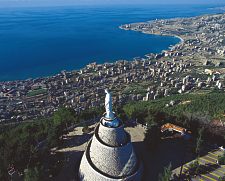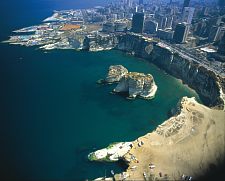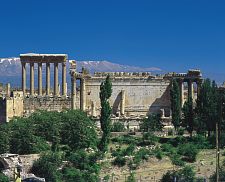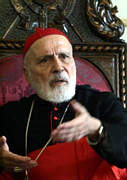|





| |
Interview with Lebanese Christian Leader Cardinal Nasrallah Sfeir
"We Don't Want a Proxy War in Lebanon"
More and more Christians are leaving Lebanon. Cardinal Nasrallah Sfeir,
patriarch of the Maronite church in Lebanon, spoke to SPIEGEL ONLINE about the
on-going Christian exodus, the future of Hezbollah and the influence of Iran and
Syria on his country.
Source:
SPIEGEL ONLINE - August 11, 2006, 03:19 PM
 SPIEGEL
ONLINE: Your Highness, what are you most worried about at the moment? SPIEGEL
ONLINE: Your Highness, what are you most worried about at the moment?
Sfeir: The progressive devastation of our country. And the growing
outward migration of Christians, who are not returning to Lebanon. We held out
in the Arab world for 2,000 years, but now things are going downhill at a rapid
pace. The current crisis is dramatically amplifying this tendency.
SPIEGEL ONLINE: But Christians in Lebanon don't speak unanimously. For
example, General Michel Aoun -- possibly Lebanon's next president -- has forged
an alliance with Hezbollah.
Sfeir: Yes. Unfortuantely there are also some Christians who make
arrangements with Hezbollah -- if only for tactical reasons. It may be unlikely,
but if Hezbollah should one day take power in Lebanon, the Christians will leave
the country in droves.
SPIEGEL ONLINE: Does Hezbollah still have a right to exist after this
war?
Sfeir: I support Prime Minister Siniora's peace plan, which calls for the
disarmament of all Shiite militias. As soon as a cease-fire with Israel takes
effect, as soon as the two sides exchange prisoners and the Shebaa Farms are
returned to Lebanon, Hezbollah will no longer have the right to maintain an
army. Hezbollah has become a state within a state, with help from Iran. That's
not something we can continue to accept after the war.
SPIEGEL ONLINE: It's common knowledge that Iran takes a different view.
Sfeir: What does Lebanon have to do with Iran's problems? Our country
mustn't serve as the one that makes it territory available as a proxy rallying
ground and battleground for other states. Neither the conflict over Iran's
nuclear program nor any other Iranian issues concern us Lebanese. Iran is a
foreign country to us. All Lebanese should take this view.
SPIEGEL ONLINE: Please describe your relationship to Syria for us.
Sfeir: What is true for Iran is also true for Syria. We refuse to
tolerate proxy wars on Lebanese territory. The Syrian Golan Heights are as
lifeless as a cemetery. So why should a struggle for the restitution of the
Golan Heights be fought out in Lebanon of all places? We want orderly relations
with Syria. That means Damascus must accept the demarcation of the
Syrian-Lebanese border and release our prisoners. But today the greatest danger
isn't coming from Syria, but from Iran. Iran is shipping weapons of all kinds
into Lebanon, including rockets, and most of all a lot of money. How can an
independent state be expected to tolerate that?
SPIEGEL ONLINE: Your Highness, you yourself come from the Palestinian
territories. Hezbollah has always declared itself to be fighting for the
"liberation" of Jerusalem. What responsibility does Lebanon have towards the
Palestinians?
Sfeir: Of course we wish for the Palestinians to have their own state on
their home territory, just like we Lebanese have our own state. The Israeli
occupation must end. But the struggle for Palestine cannot be fought from
Lebanon, the smallest and weakest state in the Arab world.
SPIEGEL ONLINE: When will Israel and Lebanon live in peace?
Sfeir: We won't follow the example of Egypt and Jordan. We can make peace
with Israel only when all other Arab states have signed a peace treaty with
Israel too.
Interview conducted by Daniel Steinvorth and Volkhard Windfuhr
|